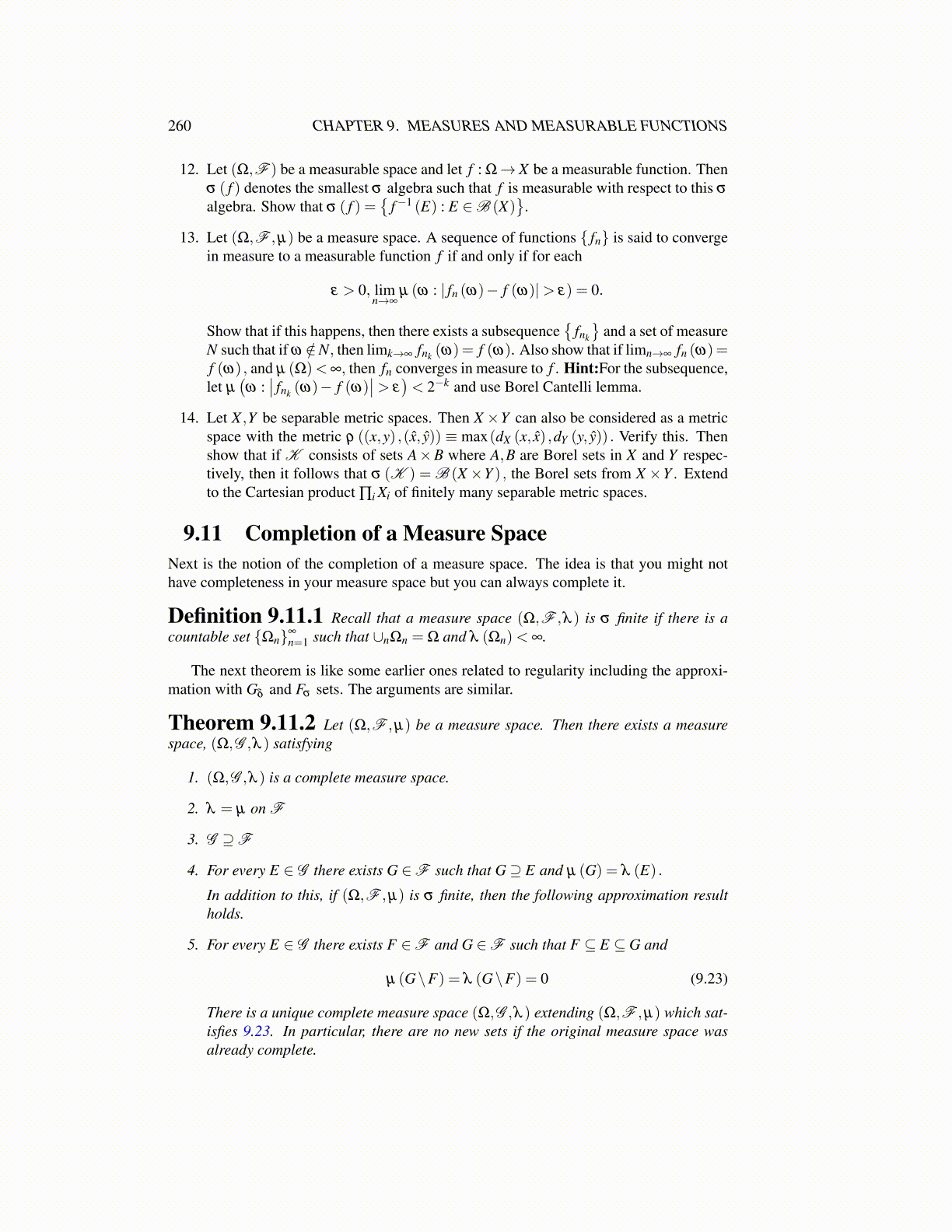
260 CHAPTER 9. MEASURES AND MEASURABLE FUNCTIONS
12. Let (Ω,F ) be a measurable space and let f : Ω→ X be a measurable function. Thenσ ( f ) denotes the smallest σ algebra such that f is measurable with respect to this σ
algebra. Show that σ ( f ) ={
f−1 (E) : E ∈B (X)}
.
13. Let (Ω,F ,µ) be a measure space. A sequence of functions { fn} is said to convergein measure to a measurable function f if and only if for each
ε > 0, limn→∞
µ (ω : | fn (ω)− f (ω)|> ε) = 0.
Show that if this happens, then there exists a subsequence{
fnk
}and a set of measure
N such that if ω /∈N, then limk→∞ fnk (ω)= f (ω). Also show that if limn→∞ fn (ω)=f (ω) , and µ (Ω)<∞, then fn converges in measure to f . Hint:For the subsequence,let µ
(ω :∣∣ fnk (ω)− f (ω)
∣∣> ε)< 2−k and use Borel Cantelli lemma.
14. Let X ,Y be separable metric spaces. Then X ×Y can also be considered as a metricspace with the metric ρ ((x,y) ,(x̂, ŷ)) ≡ max(dX (x, x̂) ,dY (y, ŷ)) . Verify this. Thenshow that if K consists of sets A×B where A,B are Borel sets in X and Y respec-tively, then it follows that σ (K ) = B (X×Y ) , the Borel sets from X ×Y . Extendto the Cartesian product ∏i Xi of finitely many separable metric spaces.
9.11 Completion of a Measure SpaceNext is the notion of the completion of a measure space. The idea is that you might nothave completeness in your measure space but you can always complete it.
Definition 9.11.1 Recall that a measure space (Ω,F ,λ ) is σ finite if there is acountable set {Ωn}∞
n=1 such that ∪nΩn = Ω and λ (Ωn)< ∞.
The next theorem is like some earlier ones related to regularity including the approxi-mation with Gδ and Fσ sets. The arguments are similar.
Theorem 9.11.2 Let (Ω,F ,µ) be a measure space. Then there exists a measurespace, (Ω,G ,λ ) satisfying
1. (Ω,G ,λ ) is a complete measure space.
2. λ = µ on F
3. G ⊇F
4. For every E ∈ G there exists G ∈F such that G⊇ E and µ (G) = λ (E) .
In addition to this, if (Ω,F ,µ) is σ finite, then the following approximation resultholds.
5. For every E ∈ G there exists F ∈F and G ∈F such that F ⊆ E ⊆ G and
µ (G\F) = λ (G\F) = 0 (9.23)
There is a unique complete measure space (Ω,G ,λ ) extending (Ω,F ,µ) which sat-isfies 9.23. In particular, there are no new sets if the original measure space wasalready complete.